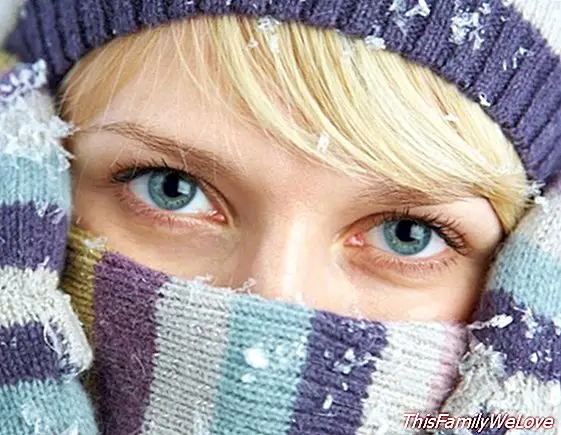How to protect the eyes in winter

The ocular dryness, which occurs due to the effect of heating, and the lack of protection against ultraviolet rays, especially when practicing winter sports in snowy areas, are the main dangers to maintain good visual health in winter. For this reason, it is essential to know a series of tips to prevent these eye problems.
How to combat dry eyes
The heating, the air conditioning and the permanence in closed air-conditioned places cause the ocular dryness, a characteristic problem of the winter months.
The discomfort that the Dry Eye It is characterized by notching or burning, as if something had got into the eye. Blink frequently is the best natural way to hydrate the eyes, as the blinking produces the tear, but when the problem persists or becomes chronic it is convenient to use artificial tears, drops or moisturizing eye drops. Eduardo Ladrón de Guevara, president of Federópticos, highlights that "this problem is more common in users of contact lenses, so it's important to properly lubricate the lens and the eyes. "There are contact lenses that release moisturizers during use or that have a greater ability to retain water.
In any case, it is highly recommended to use humidifiers or, simply, to place in the room a container with water near the heat source, which reduces the dryness in the environment.
Sunglasses, essential to avoid eye injuries in winter
We know that on the beach it is necessary to wear sunglasses, but it is even more important to wear them in winter, especially when we go to the snow and practice winter sports. Various studies have revealed that on the beach the eyes can receive between a 10 and 25 percent of the sun's rays when they bounce off the sand or the sea, but this percentage rises to 80 percent when in winter sunlight bounces on the snow.
In addition, the same happens on cloudy days. Although it is not sunny, 90 percent of the ultraviolet rays pass through the low density clouds and reach the ground, causing the same rebound effect as direct light, which can damage our vision. This problem is higher to higher compared to sea levelFor this reason, wearing sunglasses in the snow is even more necessary. Finally, in winter the position of the earth changes with respect to the sun, which is lower, which facilitates the sun's rays hitting the eye directly.
Eduardo Ladrón de Guevara, president of Federópticos, states that "in winter there are two main dangers for our eyes, too dry environments that can cause dry eyes and ultraviolet rays, to which we open the door and lower our guard when there is no sun, but they are. "
Therefore, in winter it is essential to continue eye care. Eduardo Ladrón de Guevara recalls that "it is important to use Sunglasses approved also in winter, because they reduce the reflection and protect from other harmful agents, such as the very cold wind ".
Damages caused by ultraviolet radiation in the eyes
Direct exposure to unprotected ultraviolet rays can cause burns to the cornea, which are known as keratitis. In the long term, it must be borne in mind that the damage caused by solar radiation is cumulative, which can lead to important pathologies such as waterfalls or macular degeneration, among others.
Marisol Nuevo Espín
Advice: Eduardo Ladrón de Guevara, optometrist and president of Federópticos




